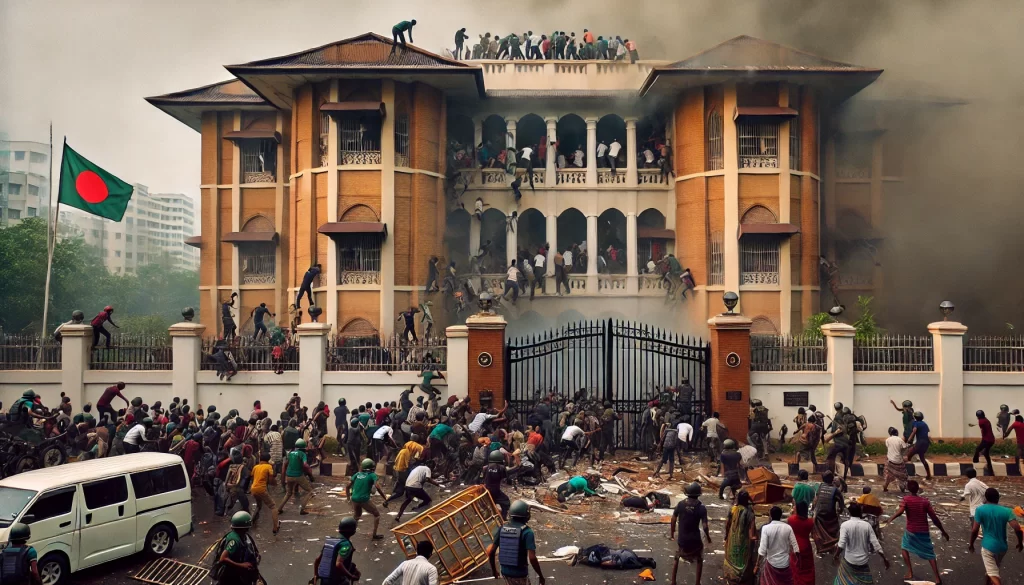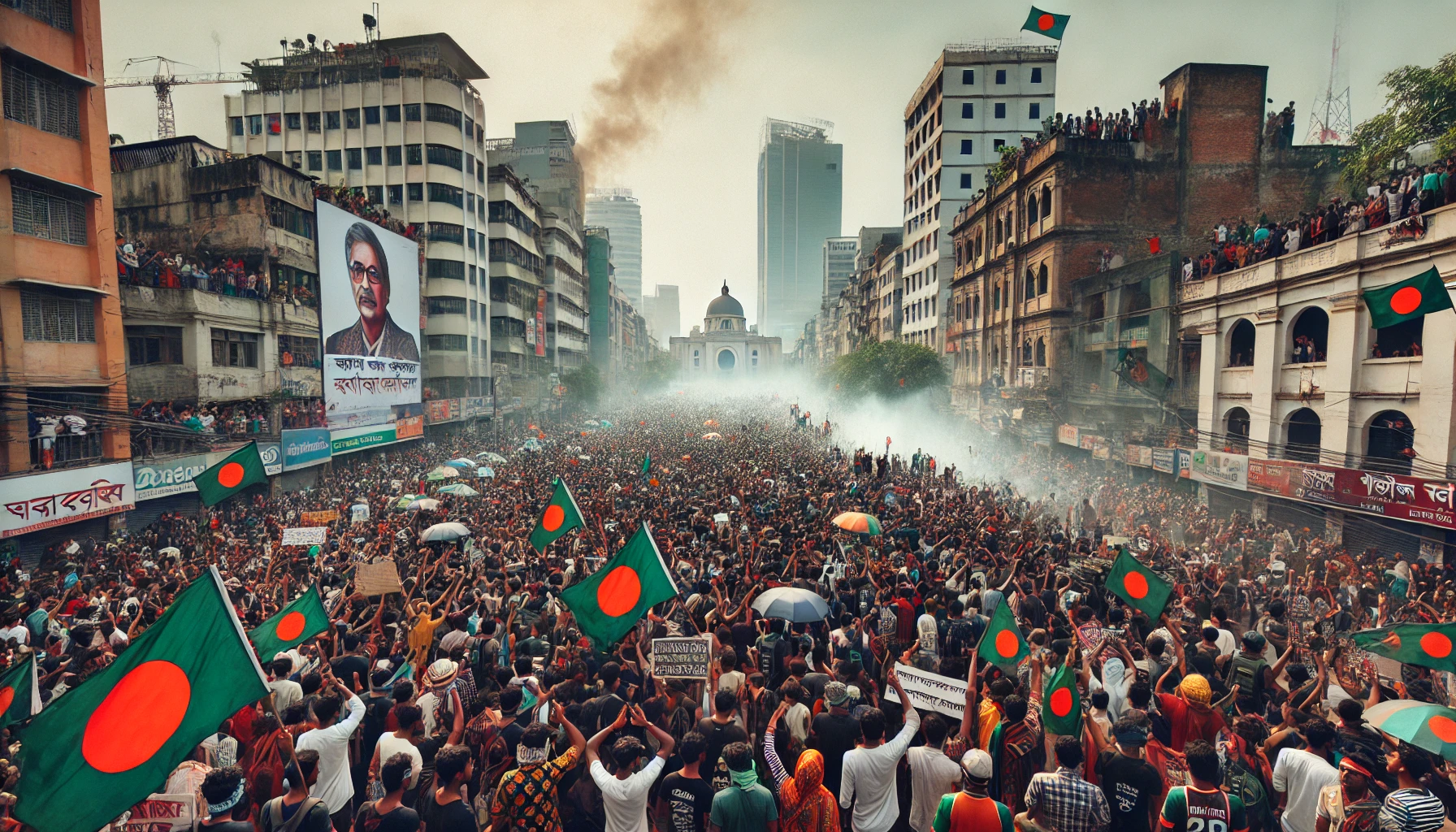Prime Minister Sheikh Hasina of Bangladesh resigned and fled the country on August 5, 2024, following weeks of escalating protests and violence. Her departure marks the end of her 15-year rule and has plunged the nation into uncertainty as the military steps in to maintain order.
Background and Hasina’s Tenure
Sheikh Hasina, 76, has been a significant figure in Bangladeshi politics for decades. The daughter of Sheikh Mujibur Rahman, the country’s founding leader who was assassinated in 1975, Hasina first served as Prime Minister from 1996 to 2001 and then again from 2009 until her recent resignation. Under her leadership, Bangladesh experienced rapid economic growth, especially in the garment industry, which helped lift many out of poverty. There were also improvements in education, health care, female participation in the workforce, and disaster preparedness.
However, Hasina’s administration was also criticized for its authoritarian tendencies. Critics accused her of using state institutions to suppress dissent and maintain power, turning Bangladesh into what many described as a one-party state. The discontent reached a boiling point over a quota system that reserved government jobs for descendants of those who fought in the 1971 war of independence, which many felt was unfair.
The Protests
The protests began peacefully in July, led by students demanding an end to the quota system. However, the demonstrations quickly escalated into a broader anti-government movement. On August 4, 2024, the protests turned deadly, with almost 100 people killed in clashes between security forces and demonstrators across the country. “This is not just the end of the tyrant Sheikh Hasina,” declared Sairaj Salekin, a student protester, “with this we put an end to the mafia state that she has created.”
Protesters stormed and looted Hasina’s official residence and other buildings associated with her party and family. Local media showed footage of people climbing the gates, smashing portraits, and taking food from catering dishes. Demonstrators also targeted symbols of Hasina’s rule, including statues and offices of her Awami League party, some of which were set on fire.
Hasina’s Resignation and Flight
Facing mounting pressure, Hasina resigned and fled Bangladesh. She was seen boarding a military helicopter with her sister, Sheikh Rehana, and their exact whereabouts remained unclear. The head of the army, Gen. Waker-uz-Zaman, announced in a televised statement that he was assuming control and would establish an interim government. “I am taking responsibility now and we will go to the president and ask to form an interim government to lead the country in the meantime,” he said.

Immediate Aftermath
Following Hasina’s departure, jubilant crowds took to the streets of Dhaka, celebrating what many saw as the end of an era. “I feel out of this world, we’re dancing in the streets now,” one protester told The Guardian. However, the celebrations soon turned chaotic, with widespread looting and vandalism reported. Thousands of people raided the prime minister’s residence, taking everything from furniture to live fish from the ponds on the grounds. Vehicles were set ablaze, and there were reports of violent clashes between protesters and police.
In response, the military imposed a curfew and temporarily closed Dhaka’s main airport to maintain order. Gen. Waker-uz-Zaman promised an investigation into the deaths that occurred during the protests and assured the public that the military would restore stability. “Keep faith in the military. We will investigate all the killings and punish the responsible,” he said.
Concerns and Future Outlook
While many celebrated Hasina’s resignation, there were also concerns about the country’s future stability. Bangladesh has a history of political violence and military coups, and the current situation has raised fears of further unrest. The military’s involvement in politics, although aimed at stabilizing the situation, has historically led to long-term control and suppression of democratic processes.
Civil society groups and opposition leaders have called for a clear plan to transition to a democratically elected government. Badiul Alam Majumdar, a civil society activist, emphasized the need for a transparent and inclusive process. “These are the heroes and heroines,” he said of the protesting students. “What we are now concerned about is who will benefit from this revolution? And that, in fact, is what we are watching – a revolution.”
The path ahead for Bangladesh is uncertain. The interim government, supported by the military, will need to navigate the complex political landscape to ensure a peaceful transition to new elections. The coming months will be crucial in determining whether Bangladesh can achieve stability and continue on its path of development.
This article is based on the following articles:

Background information
Bangladesh: A Brief Overview
Bangladesh is a country located in South Asia, sharing borders with India and Myanmar, and is situated near the Bay of Bengal. It is known for its rich culture, history, and significant contributions to the global garment industry. The country has a population of around 170 million people, making it one of the most densely populated countries in the world. The official language is Bengali, and the majority religion is Islam.
Independence and Formation
Bangladesh was originally part of British India and later became East Pakistan when India gained independence in 1947 and was divided into India and Pakistan. However, the geographical and cultural differences between East and West Pakistan (modern-day Pakistan) led to growing tensions. These tensions culminated in the Bangladesh Liberation War in 1971. The war resulted in the independence of Bangladesh from Pakistan. Sheikh Mujibur Rahman, often referred to as the “Father of the Nation,” played a crucial role in the independence movement and became the first President of Bangladesh.
Political Landscape
Since gaining independence, Bangladesh has experienced periods of political instability, including military coups and transitions between civilian and military rule. The country’s political environment has often been characterized by rivalry between the two major political parties: the Awami League and the Bangladesh Nationalist Party (BNP).
- Awami League: Founded by Sheikh Mujibur Rahman, this party has been a dominant force in Bangladeshi politics. Sheikh Hasina, Mujibur Rahman’s daughter, has led the party for many years.
- Bangladesh Nationalist Party (BNP): Another significant party, often in opposition to the Awami League, was founded by Ziaur Rahman, a military leader who later became the President of Bangladesh.
Sheikh Hasina’s Leadership
Sheikh Hasina, the daughter of Sheikh Mujibur Rahman, has been a pivotal figure in Bangladeshi politics. She first became Prime Minister in 1996 and has held the position multiple times, with her most recent tenure starting in 2009. Under her leadership, Bangladesh saw economic growth and development in various sectors, including education and healthcare. However, her rule has also been criticized for being increasingly authoritarian, with accusations of suppressing opposition and using state institutions to maintain power.
Economic Growth and Challenges
Bangladesh’s economy has grown significantly over the past few decades, largely due to the expansion of the garment industry, which is one of the largest in the world. The country has also made strides in reducing poverty and improving health and education services. However, Bangladesh faces several challenges, including high unemployment rates, corruption, and vulnerability to climate change-related disasters like flooding and cyclones.
Social and Cultural Aspects
Bangladesh has a rich cultural heritage, with influences from Hindu, Buddhist, and Islamic traditions. Bengali literature, music, and art are celebrated worldwide. The country is known for its vibrant festivals, traditional music (Baul songs), and dance forms. The annual celebration of Pohela Boishakh, the Bengali New Year, is a significant cultural event.
Understanding the Current Protests
The recent protests in Bangladesh were sparked by a controversial quota system for government jobs. This system reserved a significant portion of jobs for the descendants of those who fought in the 1971 Liberation War, which many young people felt was unfair. The protests, which started peacefully, quickly escalated into violent clashes with security forces, reflecting broader dissatisfaction with Sheikh Hasina’s government.
Military’s Role in Politics
The military has played a significant role in Bangladesh’s political history, often stepping in during times of crisis. The current involvement of the military in forming an interim government is seen as an effort to stabilize the country after Sheikh Hasina’s resignation. The military has promised to investigate the violence and ensure a smooth transition to a democratically elected government.

Debate/Essay Questions
- Should the military play a role in politics during times of crisis?
- What are the potential consequences of Sheikh Hasina’s resignation for Bangladesh’s future?
Please subscribe to Insight Fortnight, our biweekly newsletter!
